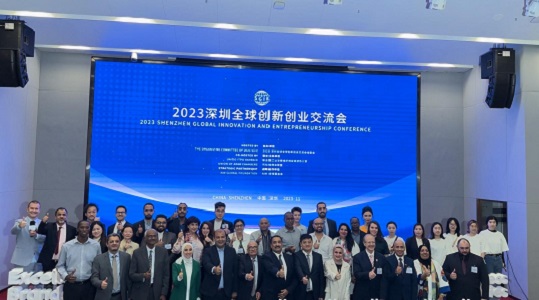Secretary General of the Union of Arab Chambers, Dr. Khaled Hanafi, confirmed during his participation in the First China International Exhibition on the Supply Chain “Connecting the World for a Common Future” under the patronage of Chinese President Chi Jiping, in the presence of the Prime Minister of the People’s Republic of China, and ministers from China and many countries of the world, in addition to the heads of international organizations, that “The global energy landscape is witnessing a major transformation due to the urgent need to address the reality of climate change and the transition to clean energy, as clean energy technologies, such as solar energy, wind energy, and thermal energy have become increasingly cost competitive and are necessary to decarbonize and mitigate global warming.”
He considered that "international cooperation is necessary to accelerate development and spread clean energy technology, build a resilient and sustainable society, and provide a fair global clean energy supply chain." Stressing that "cooperation in developing global standards and regulations for clean energy technologies can enhance market acceptance and facilitate trade across supply chains," he explained, "China is the world's largest investor in the field of renewable energy, with the value of its investments reaching more than 300 billion US dollars in this sector in 2022. On the other hand, the Arab world has great potential in the field of renewable energy, estimated at about 500 gigawatts of solar energy and 200 gigawatts of wind energy. China and the Arab countries also aim to increase their share of renewable energy to 25 percent by 2030. Therefore, bilateral cooperation in the field of trade and energy between China and the Arab countries is of utmost importance.”
He explained, “China and the Arab countries enjoy a long history of economic cooperation, with bilateral trade reaching more than $330 billion in 2022. Energy plays an important role in this bilateral trade, as China is considered the most important importer of oil and gas from the Arab world. In recent years, China has also increasingly invested in renewable energy projects in the Arab world, with investments exceeding $20 billion in solar, wind, and geothermal energy projects, which will contribute to developing the energy supply chain between the two regions.”
The Secretary-General of the Union, Dr. Khaled Hanafi, participated in the “Global Innovation Conference and Review Conference 2023”, which was hosted by the city of Shenzhen, China, and spoke in the discussion session: “Smart agriculture, food safety and security in smart cities.” Explaining that by 2050, the world population is expected to reach 10 billion people, with nearly 7 out of 10 people living in cities.
He pointed out that "the Arab world is considered among the fastest growing populations on the planet, with the population increasing by 1.7 percent, and in light of the increasing demand for food, the Arab region will face a continuing crisis of water scarcity, which poses a major challenge to the agricultural sector and food security."
He believed that "the Arab region as a whole suffers from the lowest level of food self-sufficiency, as it is the largest food importer in the world, and faces the largest water deficit." He considered that "the region's arid climate and limited water resources are motivating factors for the Arab region to become a center for agricultural innovation." Pointing out "Arab countries are keeping pace with the increasing demand for food, by developing agricultural technology solutions and taking advantage of current and emerging technologies to enhance flexible and efficient agricultural and food production systems."
He revealed, “The Kingdom of Saudi Arabia, the United Arab Emirates, and Egypt have important investments in the smart agriculture sectors to enhance the internal economy and reduce dependence on external sources, as about 50 percent of food in the region is imported from abroad. In addition, the Gulf Cooperation Council countries import 90% of the food products in the region.”
He considered that "investing in smart agriculture will contribute to enhancing growth by creating job opportunities in this vital industrial sector, and will also lead to making the Arab region an important market in the AgriTech sector and agricultural innovation."
In addition, the Union of Arab Chambers, represented by its Secretary General, Dr. Khaled Hanafi, signed a memorandum of cooperation and understanding with the Union for Promoting Youth Entrepreneurship in Shenzhen Province in China, in order to enhance the reality of Arab and Chinese entrepreneurship and entrepreneurs.
Source (Union of Arab Chambers)

